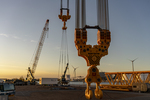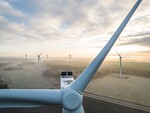07/19/2008
USA - Deerpath Energy offers small wind-energy alternative
Kellogg Warner is attempting to blow new life into the small wind turbine industry. Warner is the president and founder of Deerpath Energy Inc., a startup in Marblehead that is pushing small wind turbines, which have largely been limited to residential customers, to commercial outlets and municipalities seeking alternative energies.
Commercially speaking, small wind turbines have lived in the shadow of their utility-sized cousins installed in large wind farms. But in the face of opposition groups holding the development of projects like Cape Wind and soaring fuel costs, Warner said groups of small turbines, which can be cheaper than power derived from solar panels, could appeal to businesses such as big-box retailers as well as individual cities and towns.
“The value proposition for our customers is they’re getting, hopefully, a cheaper source of power and clean source of power,” Warner said.
Already, Deerpath has the backing of Boston-based clean technology venture capital firm Rockport Capital Partners, which has placed $3.5 million in funding in the company.
Alexander “Hap” Ellis III, general partner at Rockport Capital, was familiar with Warner, who was previously CEO of Kema-Xenergy, which is owned by Kema Inc.
After Warner left Kema-Xenergy last year “we called him and said don’t do anything until we get together and talk about this idea we’ve been carrying around,” Ellis said.
That idea was to create a company that acted as a developer for small wind turbine installations for businesses and municipalities. The way Deerpath will work is by helping businesses or towns to purchase and place several turbines on assets they already own, such as light poles and roofs. As the developer, Deerpath will even supply part or all the cost of buying the turbines and then sell the energy produced to the business or town through a power purchase agreement.
Increasingly, companies are seeking alternative energy because states are requiring it and because of public concerns around climate change. Warner said small wind turbines are a very visible way of delivering a percentage of energy — as much as 10 percent to 15 percent — and at a cheap rate. That rate can run as low as 8 cents per kilowatt hour, Ellis said.
Deerpath’s preferred manufacturer, Flagstaff, Ariz.-based Southwest Windpower, which is also backed by Rockport Capital, sees a significant new market opportunity.
“We do see, frankly, the commercial piece as being bigger than the residential piece in the future,” said Eric Siedel, Southwest Windpower’s vice president for sales and marketing.
Just under 10,000 small wind turbines were sold in the United States last year, primarily to residential customers, according to the American Wind Energy Association.
But there are some barriers Deerpath, has currently which has seven employees, faces. For one, there are few tax incentives for energy derived from small turbines, as there is for large wind farms and solar panels. And the use of it is limited to geographical areas where there is strong enough winds to make the turbines blades turn.
“The world of small wind turbines have been under appreciated from a public policy standpoint,” said Phil Giudice, commissioner of the Massachusetts Department of Energy Resources. But, he added, with fuel costs on the rise “the fundamental underlying economics of (small wind) can look pretty appealing.”
Commercially speaking, small wind turbines have lived in the shadow of their utility-sized cousins installed in large wind farms. But in the face of opposition groups holding the development of projects like Cape Wind and soaring fuel costs, Warner said groups of small turbines, which can be cheaper than power derived from solar panels, could appeal to businesses such as big-box retailers as well as individual cities and towns.
“The value proposition for our customers is they’re getting, hopefully, a cheaper source of power and clean source of power,” Warner said.
Already, Deerpath has the backing of Boston-based clean technology venture capital firm Rockport Capital Partners, which has placed $3.5 million in funding in the company.
Alexander “Hap” Ellis III, general partner at Rockport Capital, was familiar with Warner, who was previously CEO of Kema-Xenergy, which is owned by Kema Inc.
After Warner left Kema-Xenergy last year “we called him and said don’t do anything until we get together and talk about this idea we’ve been carrying around,” Ellis said.
That idea was to create a company that acted as a developer for small wind turbine installations for businesses and municipalities. The way Deerpath will work is by helping businesses or towns to purchase and place several turbines on assets they already own, such as light poles and roofs. As the developer, Deerpath will even supply part or all the cost of buying the turbines and then sell the energy produced to the business or town through a power purchase agreement.
Increasingly, companies are seeking alternative energy because states are requiring it and because of public concerns around climate change. Warner said small wind turbines are a very visible way of delivering a percentage of energy — as much as 10 percent to 15 percent — and at a cheap rate. That rate can run as low as 8 cents per kilowatt hour, Ellis said.
Deerpath’s preferred manufacturer, Flagstaff, Ariz.-based Southwest Windpower, which is also backed by Rockport Capital, sees a significant new market opportunity.
“We do see, frankly, the commercial piece as being bigger than the residential piece in the future,” said Eric Siedel, Southwest Windpower’s vice president for sales and marketing.
Just under 10,000 small wind turbines were sold in the United States last year, primarily to residential customers, according to the American Wind Energy Association.
But there are some barriers Deerpath, has currently which has seven employees, faces. For one, there are few tax incentives for energy derived from small turbines, as there is for large wind farms and solar panels. And the use of it is limited to geographical areas where there is strong enough winds to make the turbines blades turn.
“The world of small wind turbines have been under appreciated from a public policy standpoint,” said Phil Giudice, commissioner of the Massachusetts Department of Energy Resources. But, he added, with fuel costs on the rise “the fundamental underlying economics of (small wind) can look pretty appealing.”
- Source:
- Deerpath Energy
- Author:
- Edited by Trevor Sievert, Online Editorial Journalist / Author: Deerpath Energy Staff
- Email:
- ts@windfair.net
- Link:
- www.windfair.net/...
- Keywords:
- Deerpath Energy, wind energy, wind farm, renewable energy, wind power, wind turbine, rotorblade, offshore, onshore









